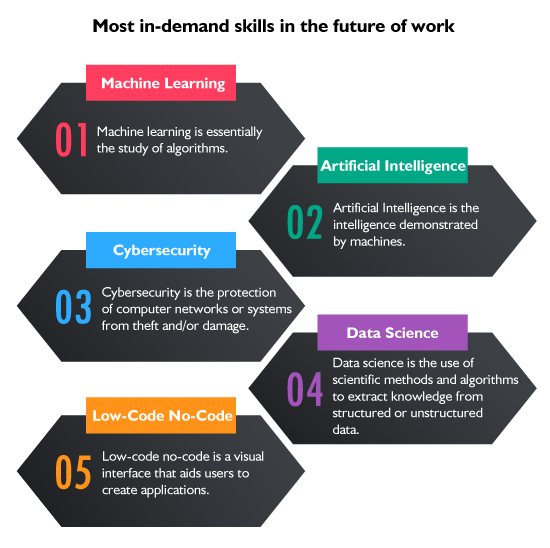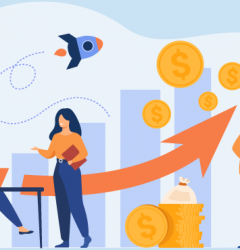
It is believed that we are living in the fourth industrial revolution. Things are changing so fast that we have no choice but to learn to adapt and be resilient. In the future of work, professions that don’t exist today may even turn up.
According to a recent report, 85% of the jobs that today’s learners will be doing in 2030 haven’t been invented yet. This has frightened a whole lot of people who believe that their roles will be rendered useless, with students, in particular, being concerned about the relevance and helpfulness of what they are currently studying.
According to a recent report, 85% of the jobs that today’s learners will be doing in 2030 haven’t been invented yet.
Let’s learn more about technological disruption and its impact on careers in the future of work!
Technological Disruption
Since technology is constantly evolving and being incorporated into work, it is inevitable for many jobs to become automated. However, this doesn’t mean the human aspect of working is going to be completely removed from the equation. Despite the disruption in regular professional norms, the value of human talent will always prevail, perhaps even more so in tech-related jobs.
If you want to prepare for later, there are several things you can do. We have created a guide to show you a glimpse of this future of work and how to be and continue to be resilient.
Also read: Top 5 Technology Priorities for Enterprises Preparing for Economic Slowdown
Jobs that will be disrupted by automation
Some professions will thrive due to technological disruption, but others might suffer instead when they become replaceable in their jobs. Machines are most likely to take over jobs that involve monotonous physical effort.
Companies will find it more convenient to automate repetitive tasks to save time and costs – robots do not get tired or demand compensation. After the initial expenditures incurred on investment and occasional maintenance, companies can save a ton of money in the long run that they would have otherwise spent on salaries.
How professions will thrive
Some professions that automation will further disrupt are bookkeepers, travel agents, and proofreaders. If you see your career in this list, it might be time to consider learning a new skill.
People tend to forget a crucial aspect of automation – AI is not here to replace us but to make our lives easier. Therefore, an incentive for investing in automation is to help employees become more productive.
AI will create more jobs than it destroys.
world of economic forum
While a company may let go of some staff, they will hire professionals elsewhere. Another aspect that we must take into consideration is that machines lack empathy and creativity. Only human beings can fulfill roles that involve these two skills.
Therefore, jobs like lawyers, nurses, or teachers aren’t likely to be replaced by machines.

Reskilling and Upskilling
According to the World Economic Forum, by 2022, more than half of the world’s employees will have to learn new skills.
Being open to and learning new skills is very important to stay relevant and resilient in this environment and can help you secure a career despite changing times. For example, in this day and age, it is crucial to keep up with online learning.
Reskilling and upskilling enable you to continue to be a valuable asset for companies in the future of work.
Let’s look at definitions, shall we?
According to the Cambridge dictionary, upskilling is “the process of learning new skills or of teaching workers new skills,” while reskilling is “the process of learning new skills so you can do a different job, or of training people to do a different job.”
Whether you choose to reskill or to upskill to update your knowledge, here are some of the most in-demand skills in the future of work:

1. Machine Learning
It is a sub-discipline of artificial intelligence. With machine learning, computers can learn from data identification without human intervention.
People often have a misconception that ML is a variation of deep learning, but in actuality, they’re both very different. While ML allows devices to learn from experience, deep learning provides them with reasoning.
2. Artificial Intelligence
People have this futuristic opinion about artificial intelligence but what they don’t realize is that the concept of AI has been with us since 1995 when John McCarthy coined the term.
It refers to the machines’ ability to simulate our behavior. Some of the most commonly used AI applications in our lives are smart speakers like Alexa and chatbots.
3. Cybersecurity
Cybersecurity is one of the most important factors inside a company in terms of data protection. Cyber-crimes or data breaches can lead to extremely huge losses for many businesses; that’s why many brands are investing in this to keep their work secure.
In the future of work, where most jobs are handled remotely, the need for cybersecurity experts will increase, making this a very promising and in-demand career.
4. Data Science
Data science is a discipline used in many industries. It consists of using data analysis to identify trends or patterns that can help solve a problem or confirm a hypothesis. Data science is used on drug development, climate change, and the stock market to issue predictions.
In upcoming times, this skill will continue to be valuable, but you’ll probably need to combine it with other skills like coding or machine learning. If you have experience in the financial industry, you might be familiar with data science fundamentals like statistics and data filtering.
5. Low-Code No-Code
A low-code no-code platform allows all types of users, aka citizen developers, to create applications by a convenient visual interface of a simple drag-and-drop system of application components without having to write any code. Although this is not going to replace software developers, it’s a popular trend that optimizes the development process and speeds up work.
Low-code, no-code platforms automate workflow processes, saving unnecessary time consumption and overhead costs in the long run. Subsequent times imply that it is important to do this. Otherwise, it can hamper the efficiency of your company as employees will spend their valuable time in activities that can be easily automated, and the organization will not reach its full potential.
Also read: LCNC: Is it completely worth the hype?
Soft skills that will be relevant in the future of work
One of the most important factors in the future of work is having soft skills to guide you through the process. While you need to learn hard skills like data science or machine learning, it’s also essential for you to embrace your soft skills.
Some of the most relevant ones are resilience, problem-solving, creativity, and logical thinking.
Conclusion
The future of work is determined by your outlook toward technological disruption. Your career may be affected in a favorable or unfavorable manner; it is then up to you to learn new skills and capitalize on them so as to continue being an asset.
In the end, it’s all about what you do during challenging situations that define you. If you learn to adapt and be innovative, nothing can stop you.
Frequently Asked Questions(FAQs)
What are future work skills?
Future work skills will likely include a mix of technical and soft skills, such as adaptability, digital literacy, problem-solving, creativity, emotional intelligence, and collaboration.
Which skill has the highest demand in the future?
Skills related to data analysis, artificial intelligence, cybersecurity, and digital marketing are expected to have high demand in the future job market.
What skills will be needed in 2050?
In 2050, skills related to AI, automation, sustainability, and advanced problem-solving will likely be crucial. Additionally, adaptability and resilience will remain important as work environments evolve.
Which work will be best in the future?
Jobs that involve emerging technologies like AI, renewable energy, healthcare, and data science are likely to be among the best in the future. However, the “best” job will vary based on individual interests and skills.
Which skill is better for the future?
Skills that combine technical proficiency with adaptability and problem-solving are often considered better for the future. For example, data science skills combined with the ability to apply them to different industries.
Subscribe
Login
Please login to comment
0 Comments
Oldest















